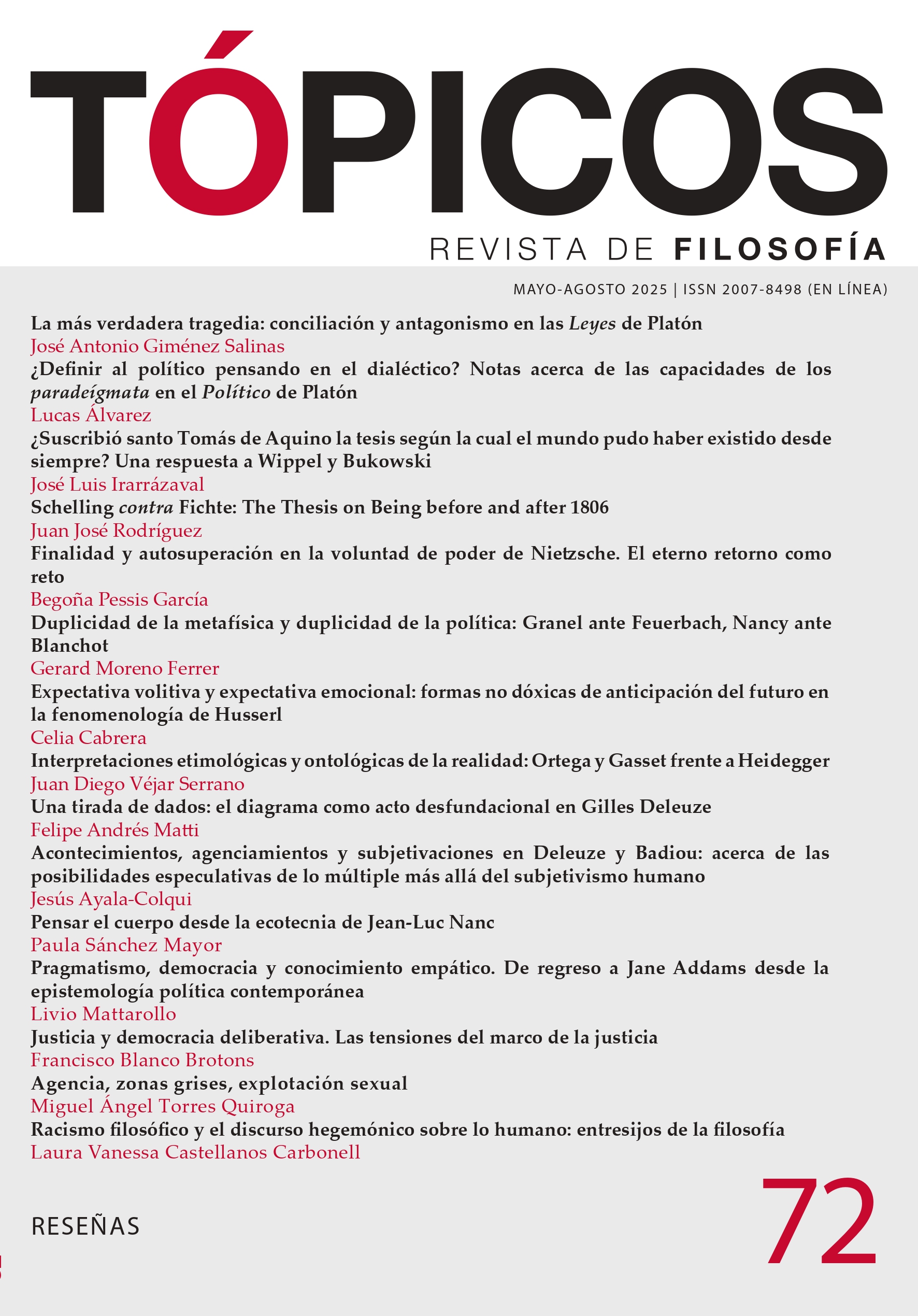Did St. Thomas Aquinas Endorse the View that the World Could Have Always Existed? A Reply to Wippel and Bukowski
Published 2025-02-20
Keywords
- possibility,
- eternity of the world,
- cosmology,
- Thomas Aquinas,
- contemporary interpreters
Copyright (c) 2025 Tópicos, Revista de Filosofía

This work is licensed under a Creative Commons Attribution-NonCommercial-NoDerivatives 4.0 International License.
How to Cite
Abstract
Regarding the topic of the eternity of the world, the following position is often attributed to St. Thomas Aquinas: that the world, in fact, had a beginning, but could have always existed. However, in none of Aquinas’ texts can an explicit defense of the possibility of an eternal world be found. Nevertheless, at least two authors, John F. Wippel and Thomas Bukowski, offer a systematic defense in favor of such attribution. This paper argues for the opposite, namely, that it is inaccurate to attribute to Aquinas the claim that the world could have always existed. For this, the argumentation of the two aforementioned authors is reviewed step by step, and a counterargument for both is presented. The paper then turns to the distinction that Aquinas himself makes regarding the various senses of “possible” in article 14 of De potentia. This distinction is used to complement Giles of Rome’s framework in order to provide greater clarity regarding Aquinas’ precise stance on the possibility of an eternal world.
References
- Bukowski, T. (1991). Understanding St. Thomas on the Eternity of the World: Help from Giles of Rome?. Recherches de Théologie Ancienne et Médiévale, 58, 113-125. https://doi.org/10.2143/RTPM.58.0.2016299
- Comisión Leonina. (1976). De aeternitate mundi. Prefacio y texto. En T. de Aquino, Opera omnia iussu Leonis XIII P. M. edita. Tomus XLIII (pp. 49-89). Editori di San Tommaso.
- De Aquino, T. (1949). Opuscula omnia necnon opera minora. Vol. 1. J. Perrier (ed.). Lethielleux.
- De Aquino, T. (1954). Opuscula Philosophica. R. M. Spiazzi (ed.). Marietti.
- De Aquino, T. (1959). Suma teológica. Tomo II. 1 q. 27-74. A. Colunga (trad.). BAC.
- De Aquino, T. (1967). Suma contra los gentiles. I. Libros 1° y 2°. Dios. Su existencia, su naturaleza. La creación y las criaturas. L. Robles Carcedo y A. Robles Sierra (trads.). BAC.
- De Aquino, T. (1976). Opera omnia iussu Leonis XIII P. M. edita. Tomus XLIII. De principis naturae. De aeternitate mundi. De motu cordis. De mixtione elementorum. De operationibus occultis naturae. De iudiciis astrorum. De sortibus. De unitate intellectus. De ente et essentia. De fallaciis. De propositionibus modalibus. Editori di San Tommaso.
- De Aquino, T. (2000). Opera omnia. Recognovit ac instruxit Enrique Alarcón automato electronico Pompaelone ad Universitatis Studiorum Navarrensis. E. Alarcón (ed.). EUNSA. https://www.corpusthomisticum.org/cmp00.html
- De Aquino, T. (2002). De aeternitate mundi. J. M. Artola (trad.). Ediciones Encuentro.
- De Aquino, T. (2005). Comentario a las Sentencias de Pedro Lombardo. Volumen II/1. La creación: ángeles, seres corpóreos, hombre. J. Cruz Cruz (ed. y trad.). EUNSA.
- De Aquino, T. (2005). Opúsculos y cuestiones selectas. III. A. Osuna Fernández-Largo (trad.). BAC.
- De Aquino, T., De Brabante, S. y Buenaventura. (1964). On the Eternity of the World. C. Vollert, L. H. Kendzierski y P. M. Byrne (eds. y trads.). Marquette University Press.
- Egidio Romano. (1581). In Secundum Librum Sentetiarum Quaestiones. Franciscum Zilettum. https://play.google.com/books/reader?id=mP4zjfW6N4sC&pg=GBS.P P2&hl=es
- Gilson, É. (1978). El tomismo. Introducción a la filosofía de santo Tomás de Aquino. F. Múgica (trad.). EUNSA.
- Grange, G. M. (2019). Albert le Grand et Thomas d’Aquin : un débat sur le commencement du monde créé. [Tesis de maestría, Université de Fribourg]. FOLIA. https://folia.unifr.ch/unifr/documents/30 8509
- Irarrázaval, J. L. (2024). Discusión sobre el “pasaje clave” en el De aeternitate mundi de santo Tomás de Aquino. En R. Cúnsulo, C. Lértora y S. Violante (eds.), Thomas audit. Miscelánea celebratoria. 1225/1274/2024 (pp. 79-90). Editorial RLFM.
- Knuuttila, S. (1993). Modalities in Medieval Philosophy. Routledge.
- Noone, T. B. (1996). The Originality of St. Thomas’s Position on the Philosophers and Creation. The Thomist: A Speculative Quarterly Review, 60(2), 275-300. https://doi.org/10.1353/tho.1996.0025
- Torrell, J. P. (2002). Iniciación a Tomás de Aquino: su persona y su obra. EUNSA.
- Van Veldhuijsen, P. (1990). The Question on the Possibility of an Eternally Created World: Bonaventura and Thomas Aquinas. En J. B. M. Wissink (ed.), The Eternity of the World in the Thought of Thomas Aquinas and his Contemporaries (pp. 20-38). E. J. Brill. https://doi.org/10.1163/9789004452657_005
- Vollert, C. (1964). Translator’s Introduction. En C. Vollert, L. H. Kendzierski y P. M. Byrne (eds.), On the Eternity of the World (pp. 2-17). Marquette University Press.
- Wallace, W. A. (1974). Aquinas on Creation: Science, Theology, and Matters of Fact. The Thomist: A Speculative Quarterly Review, 38(3), 485-523. DOI: https://doi.org/10.1353/tho.1974.0039
- Weisheipl, J. A. (1983). The Date and Context of Aquinas’ De aeternitate mundi. En L. P. Gerson (ed.), Graceful Reason. (pp. 239-271). Pontifical Institute of Mediaeval Studies. https://doi.org/10.1163/9789004612792_016
- Wilks, I. (1994). Aquinas on the Past Possibility of the World’s Having Existed Forever. The Review of Metaphysics, 48, 299-329. http://www.jstor.org/stable/2012 9674
- Wippel, J. F. (1981). Did Thomas Aquinas Defend the Possibility of an Eternally Created World? (The De aeternitate mundi Revisited). Journal of the History of Philosophy, 19, 21-37. https://doi.org/10.1353/hph.2008.0601.
- Wippel, J. F. (1984). Thomas Aquinas on the Possibility of Eternal Creation. En J. F. Wippel, Metaphysical Themes in Thomas Aquinas (pp. 191-214). Catholic University of America Press.





